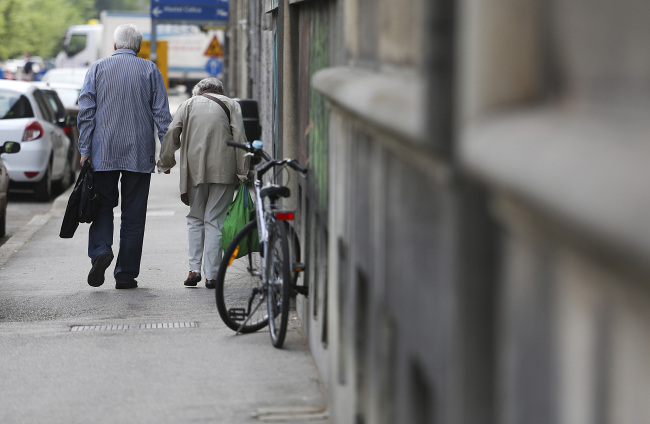BRUSSELS (AP) ― European finance ministers on Monday urged Slovenia to move swiftly in addressing the problems in its banking sector and get its public finances under control in a bid to avoid the nation from becoming the bloc’s sixth member to require a bailout.
“The Slovenian government has to take swift and decisive action,” said Jeroem Dijsselbloem, who chairs the meetings of finance ministers from the 17 European Union countries that use the euro. “First and foremost Slovenia has to restore trust in its banking sector,” he added.
Markets have started worrying over the state of Slovenia’s shaky banks, which are reeling from a burst real estate bubble and unpaid property loans. The tiny Alpine nation accounts for only 0.4 percent of the eurozone’s overall 10 trillion euros economy, but the lenders’ troubles are large enough that investors fear the government might face huge costs rescuing them.
 |
An elderly couple walk along a street in Ljubljana, Slovenia, Friday. (Bloomberg) |
While its overall public debt is well below the 27-country EU average, the country of 2 million is already facing difficulties refinancing its debt, forcing it to implement budget cuts and tough reforms.
Slovenia presented its reform plans to the ministers and top EU officials gathered in Brussels, trying to convince them that it can handle the situation on its own without requiring emergency loans and joining the bailout club of Greece, Portugal, Ireland, Spain and Cyprus.
Besides budget cuts, tax hikes and other measures Slovenia presented, the government is also setting up a so-called bad bank to take shaky loans and investments off lenders’ hands.
German Finance Minister Wolfgang Schaeuble voiced confidence that the government will implement the program through without requiring outside assistance, especially since there was no alternative to the painful measures.
“The relevant countries have to push through difficult adjustments one way or the other,” he said ahead of the meeting. “By now, the insight that rescue programs are not exactly invitations for comfort is also well-known,” he added.
The EU Commission, the bloc’s executive arm, will assess the proposals by the end of the month.
The Commission’s top economic official, Olli Rehn, said after the meeting “it is too early to say whether the program provides a sufficient answer to the problems the country is facing at the moment.”
The ministers in Brussels also met their new Italian counterpart, Fabrizio Saccomanni, who briefed them on his coalition government’s economic and financial policies.
Italy has the eurozone’s third-largest economy after Germany and France. Markets have greeted the new centrist administration with relief after February’s inconclusive elections, but the finance ministers left no doubt that they expected the reforms of former Prime Minister Mario Monti’s government to be continued.
“We called on the new government to maintain the pace of fiscal consolidation,” Dijsselbloem said. “We were reassured to learn that the government intended to pursue an ambitious structural reform agenda aimed at raising Italy’s growth potential and addressing the country’s imbalances,” he added.
Italy is saddled with a huge debt ― about 127 percent of its annual economic output, second only to Greece. While its economy was growing, the country was able to manage its debt. However, a leading international economic body forecasts Italy’s economy will shrink by 1.5 percent this year and grow only 0.5 percent in 2014. That will push the country’s debt up to 131.5 percent of annual GDP, according to a forecast by the Organization for Economic Cooperation and Development.







![[Weekender] Korea's traditional sauce culture gains global recognition](http://res.heraldm.com/phpwas/restmb_idxmake.php?idx=644&simg=/content/image/2024/11/21/20241121050153_0.jpg)
